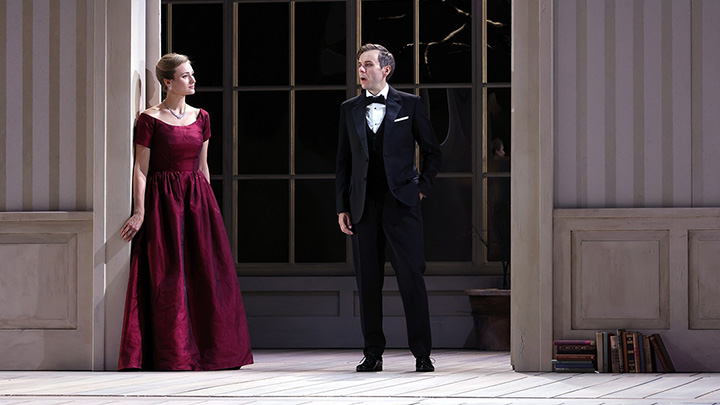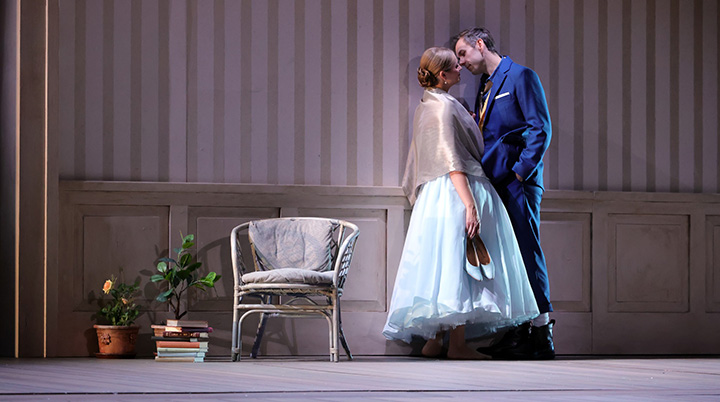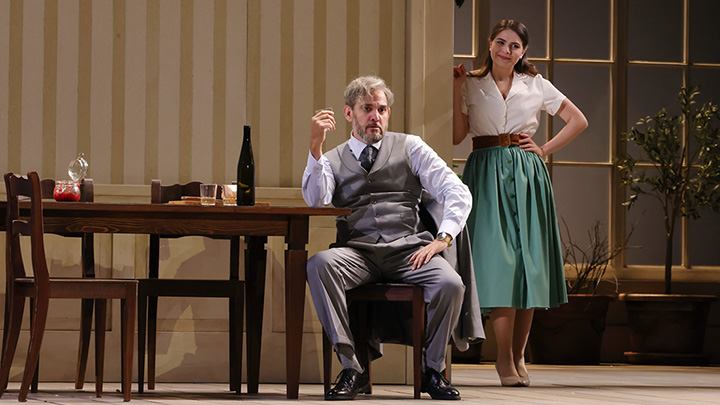Christmas in July – parterre field

This may make him, maybe, an odd alternative of a collaborator for Christof Loy, for whom singers are fashions and whose productions are slick, seductive, and subversively economical in that John Dexter manner. For the sexed-up singers of Loy’s measured stagings, the expression physique du rôle simply feels redundant. However in opposition to the grain of Bernheim’s self-deprecations (with which I wholeheartedly disagree, by the way in which), the tenor and the director proved a deft match in La Scala’s manufacturing of Massenet’s Werther – solely Bernheim’s second outing with the half – in Milan final week.
At first evincing an affable, Stanley Tucci-like intercourse enchantment and a voice with a seemingly countless palate of timbral and dynamic modifications, Bernheim’s gradual arrival to Goethe’s tortured poet was well worth the wait. He doesn’t brood or smolder – not less than not at first – in contrast to the position’s different main exponent Jonas Kaufmann. Relatively, Bernheim’s hipsterish Werther stays swaggering, youthfully insecure, and infrequently apoplectically determined. Watching Werther tenderly play with Charlotte and Sophie’s sblings within the first act, you may lastly perceive what Sophie means when she later says to Charlotte, “Tous les fronts ici sont devenus moroses depuis que Werther s’est enfui.”

Bernheim’s is a completely mature Werther within the particulars, his anguish over his unrequited love rising as miraculous and painful shifts in shading and dynamics just like the plaintive anguish of the second he learns about Charlotte’s marriage; although the tone thickens in moments like this, it sounds neither pushed nor bloated. Elsewhere, in his “Ô nature” entrance, it was the clear caress of his assault that impressed, giving strategy to a beefy voix mixte that notably got here again in a wonderful diminuendo B-flat to crown a “Porquoi me réveiller?” distinguished for its depth and restraint. His amber-colored tenor simply flowed and flowed indefatigably all through the night; this was my first time seeing him carry out stay and I used to be smitten.
It was this depth and intricacy, fluidity and class that made Loy such an in a position associate. His Werther doesn’t deviate from the spare, glamorous midcentury aesthetic for which he’s identified, however nonetheless highlights the refined cues of Massenet’s rating to create a staging that feels particularly alive and detailed. The damaging blurring of boundaries between indoors and open air (a attribute of Johannes Leiacker’s units, lit skillfully by Roland Edrich), the feelings saved inside and people we dare to externalize, both straight or masked by artwork, is a trademark correctly and subtly extracted from the opera.
Conductor Alain Altinonglu appeared equally in on this take; whereas the thorniness of the rating’s opening chords didn’t a lot foreshadow the Romantic crush of his studying of the rating, his fearlessness in the direction of evoking large, theatrical gestures from the La Scala orchestra (just like the particularly potent entrance of the saxophone in Charlotte’s Letter Scene) gave the efficiency an pleasure and scope past Loy’s airtight domesticity.
However even that sense of domesticity was fastidiously wrought; Sophie and Albert, Charlotte’s husband, are extra current on this manufacturing (Loy even reallocates warning about Albert’s return, that the Bailiff – Armando Noguera—provides to Charlotte following her night with Werther, to Sophie). Francesca Pia Vitale’s milky soprano was minimize via with grit as Charlotte’s doting sister, although Jean-Sébastien Bou was extra memorable for his threatening appearing than his stinging however unfocused baritone.

Solely Victoria Karkacheva, got here as a disappointment. Positive, she’s glamorous wanting, however she was so missing in charisma that usually occasions I forgot she was even onstage. What’s extra, her vague, light-weight wooly mezzo not solely lacks depth down beneath, however the vibrato up high takes on an incessant hammering high quality. This was most in the course of the Letter Scene which by no means took off, garnering a smattering of applause halfway via for a “Ces lettres” whose ending barely registered. Too blandly winsome for any actual iciness, Karkacheva’s upcoming collaboration with Loy – as Olga in Eugene Onegin in Madrid subsequent 12 months – will most likely be a greater match. However I think about that as Carmen – which she sings in Naples this fall—she most likely prefers chamomile to manzanilla.
Abutting a sold-out new manufacturing of Turandot starring Anna Netrebko that I’m lacking, Werther, absent from La Scala since 1980, could have been the extra delicate of La Scala’s summer season choices. However its filigreed depth must be not less than as nice as something Puccini and his throngs may very well be mustering later this month.
Photographs: Marco Brescia & Rudy Amisano

